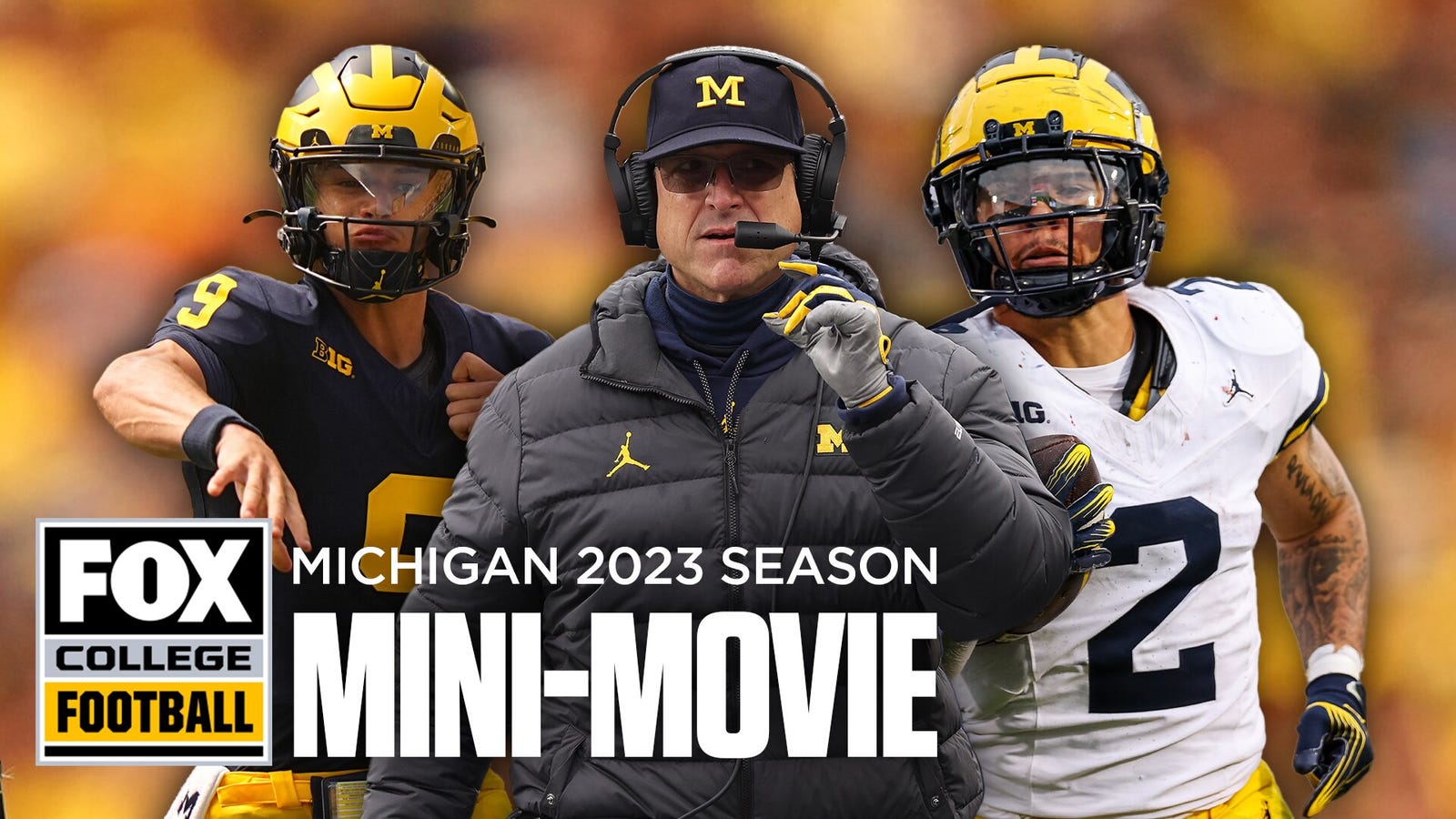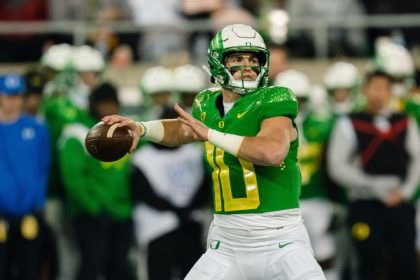PASADENA, Calif. — When it comes to storylines, this season’s College Football Playoff semifinal at the Rose Bowl has no shortage of them.
There is the greatest to don a headset at this level in Nick Saban, crafting perhaps the best coaching job of his career. There is Jim Harbaugh’s attempt to get the monkey off his back and ensure all of this year’s antics and distractions around the program were not in vain.
There is Michigan, the winningest college football program ever (1,002 victories) taking on the one right behind them in Alabama (965). The No. 1 seed versus the No. 4 that nobody wanted to play. And star quarterbacks on both sides surrounded by a slew of future NFL draft picks.
The Granddaddy of Them All, indeed.
ADVERTISEMENT
Yet for nearly all involved in the run-up to Monday’s action at the most hallowed ground college football has to offer, something else has percolated. Though the mind could run wild as to the potential possibilities for shenanigans given all that we’ve seen out of Ann Arbor and Tuscaloosa in 2023 — to say nothing of the general inane spectacle that college football’s postseason brings out every December — few could have put down a marker on their Rose Bowl bingo card about an Australian sports technology company occupying a prominent role as the main topic for discussion.
That company, Catapult, is headquartered in Melbourne but is a veteran operator behind the scenes in the college football space. Though some fans are tangentially aware of the brand as a result of their player tracking abilities (often seen as a bra-like support beneath a player’s shoulder pads that houses a small GPS chip), programs know it more for its video technology, which has become ubiquitous for everything from watching game film to practice cut-ups.
Despite the seemingly innocuous nature of what Catapult does, it has been at the forefront of just about every question ahead of the Rose Bowl. The genesis of the story came on Thursday when Alabama players, initially unveiled by wide receiver Isaiah Bond, confirmed they were no longer able to watch film on their individual iPads, as is normally the case.
“I’m not concerned about that. Our players have had every opportunity to get ready for this game just like any other game,” said Saban on Saturday, eyes rolled in full annoyance. “That’s not an issue that I’m concerned about or that our players are concerned about or that’s worth discussing here 48 hours before the game.”
Almost immediately, the natural assumption was that this was in some way a reaction to or related to the Connor Stalions sign-stealing scandal which dominated headlines when allegations were first revealed back in October.
However, Michigan players and coaches subsequently confirmed they too were avoiding watching film on their iPads after being alerted to a potential issue several weeks before the regular season concluded.
“There’s been these rumors out there, about the cloud and the Catapult system. I think our team is just taking precautions,” noted Harbaugh. “People just started talking about that. We know very little about it and how it works.
“I think our university, that doesn’t have anything to do with it. Please know that I’m not accusing anybody of anything. Just really don’t know.”
When pressed as to the source of such rumors and why they were being given so much credibility, neither the Tide nor the Wolverines provided much in the way of clarity or transparency.
“We all heard it, early November,” UM offensive coordinator Sherrone Moore remarked. “We kind of got our players away from using their iPads, just kind of attacked the process and how we need to (prepare) and just watched more film in the building.”
In a statement to FOX Sports, Catapult addressed the comments from both sides and denied any potential issues with how film is stored or accessed.
“We are aware of the ongoing investigation of the alleged unauthorized access to NCAA football video footage,” a company spokesperson wrote. “We have conducted an internal investigation and have not found any security breach in our systems. We have shared this with local authorities that are conducting an investigation. We will continue to support the ongoing investigation with the NCAA and local authorities. At Catapult, we hold ourselves to the highest standards and safeguarding customer information is of utmost importance to us.”
The company declined to identify the specific local authority that is investigating the case. But in many ways, it speaks to the unease surrounding this Rose Bowl matchup that one could readily identify at least three different inquiries surrounding the Big Ten champions that could be central to the matter.
Alongside the NCAA’s ongoing look into whether Stalions violated in-person scouting rules while an analyst on staff in Ann Arbor, the school has also been dealing with a joint University of Michigan Police and FBI investigation into computer access crimes that led to the firing of former offensive coordinator and QB coach Matt Weiss last January.
Then there is the case involving ex-linebackers coach Chris Partridge, who was let go in mid-November after the school alleged he had discussed the ongoing NCAA probe with someone against regulations. Partridge later wrote a statement distributed on his social media channels that also added he did not destroy any evidence related to such investigations after reports surfaced that he may have done just that.
Perhaps it is no wonder that in light of so much noise on these fronts, both Rose Bowl opponents are just a bit more hesitant to operate as they normally do, instead taking precautions to eliminate any potential opening for mischief — even if Catapult itself is saying nothing is wrong.
“You’re aware of things that go on, you’re aware of teams that do certain things. You try not to become paranoid or let it throw you or your team off,” Bama offensive coordinator Tommy Rees said. “You do certain things here or there, but you keep the same mentality. A lot of people do (steal signs) but it kind of is what it is.”
Heck, being paranoid in college football actually feels quite normal nowadays — especially in places like the Big Ten and SEC, where every morsel of information is digested by ever larger support staffs in the quest to gain a faint iota of an advantage. Closed practice sessions have become the norm for most teams, and fields are often surrounded by ever-increasing security layers to keep prying eyes away. Famously in Tuscaloosa, apartment complexes near the Tide’s facilities have restrictions on what residents can do when the team is on their practice fields.
The players seem to understand this better than most and are even taking things in stride far easier than their coaching staffs. Though banning film study on iPads has been an annoying quirk in the routine, it seems as though leaving no stone unturned as a way to ensure victory this week is completely understandable.
“You have no choice if you get on social media. You can’t avoid what’s going on,” said Alabama offensive tackle JC Latham. “But we don’t really focus too much on another team.”
“Here at Alabama, we prepare the same way for everything, no matter who’s playing or when we’re playing them or how big the game is,” added cornerback Kool-Aid McKinstry. “The same way regardless.”
That hasn’t really been the case this week, however.
Instead, paranoia has gripped the Rose Bowl, and there’s not much overshadowing that given what has transpired in the march toward this most unique New Year’s Day game.
Bryan Fischer is a college football writer for FOX Sports. He has been covering college athletics for nearly two decades at outlets such as NBC Sports, CBS Sports, Yahoo! Sports and NFL.com among others. Follow him on Twitter at @BryanDFischer.
COLLEGE FOOTBALL trending

Get more from College Football Follow your favorites to get information about games, news and more














